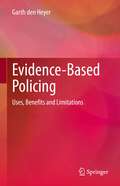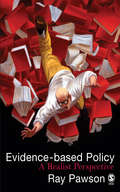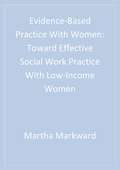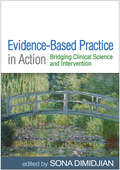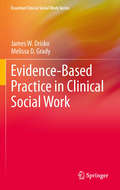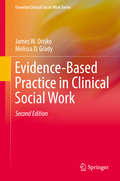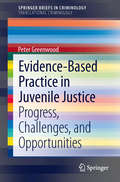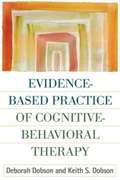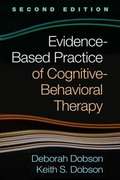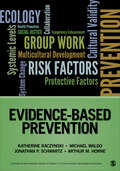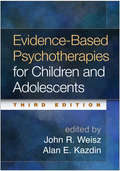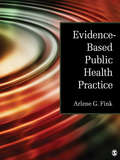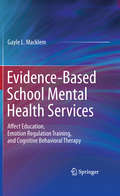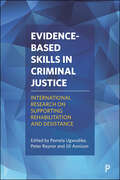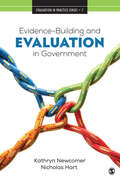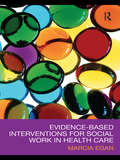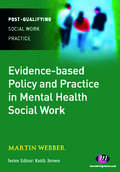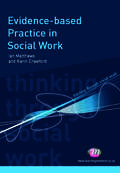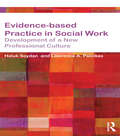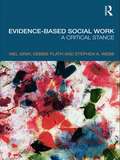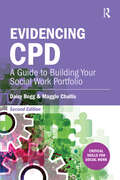- Table View
- List View
Evidence-Based Policing: Uses, Benefits and Limitations
by Garth den HeyerThe volume aims to increase knowledge and understanding of how evidence-based policing is being adopted and implemented by police agencies in the United States and whether it is affecting the agencies' processes, strategies, community relationships and delivery of community-oriented policing services. This exploration is based on data drawn from the literature, interviews and extensive field research that resulted in the case studies presented and discussed in the book. The goal of this text will be to provide the reader with a thorough analysis of the concepts, arguments and challenges facing evidence-based policing. The history of evidence-based policing, how evidence-based practices are used in the health and social sectors, and in the United Kingdom will be examined. In addition, reasonable options for improving the use of evidence-based policing will be proposed. Overall, very practical policy implications will be outlined by a highly recognized professional who has considerable experience in policing and related research.
Evidence-Based Policy: A Realist Perspective
by Ray PawsonIn this important new book, Ray Pawson examines the recent spread of evidence-based policy making across the Western world. Few major public initiatives are mounted these days in the absence of a sustained attempt to evaluate them. Programmes are tried, tried and tried again and researched, researched and researched again. And yet it is often difficult to know which interventions, and which inquiries, will withstand the test of time. The evident solution, going by the name of evidence-based policy, is to take the longer view. Rather than relying on one-off studies, it is wiser to look to the ′weight of evidence′. Accordingly, it is now widely agreed the most useful data to support policy decisions will be culled from systematic reviews of all the existing research in particular policy domains. This is the consensual starting point for Ray Pawson′s latest foray into the world of evaluative research. But this is social science after all and harmony prevails only in the first chapter. Thereafter, Pawson presents a devastating critique of the dominant approach to systematic review - namely the ′meta-analytic′ approach as sponsored by the Cochrane and Campbell collaborations. In its place is commended an approach that he terms ′realist synthesis′. On this vision, the real purpose of systematic review is better to understand programme theory, so that policies can be properly targeted and developed to counter an ever-changing landscape of social problems. The book will be essential reading for all those who loved (or loathed) the arguments developed in Realistic Evaluation (Sage, 1997). It offers a complete blueprint for research synthesis, supported by detailed illustrations and worked examples from across the policy waterfront. It will be of especial interest to policy-makers, practitioners, researchers and students working in health, education, employment, social care, criminal justice, regeneration and welfare.
Evidence-Based Practice With Women: Toward Effective Social Work Practice With Low-Income Women (Evidence-Based Practice in Social Work)
by Bonnie L. Yegidis Martha J. MarkwardThe first book to focus on evidence-based social work practice with low-income womenThis one-of-a-kind book presents evidence-based coverage of the assessment and treatment of the most common mental health disorders among women, particularly low-income women. For each disorder— depression, post-traumatic stress disorder and trauma (including sexual abuse), generalized anxiety disorder, substance use disorder, and borderline personality disorder—the authors include assessment instruments and detailed case examples that illustrate the assessment and treatment recommendations.
Evidence-Based Practice in Action: Bridging Clinical Science and Intervention
by Sona DimidjianA growing number of empirically supported treatments are available to mental health practitioners, yet evidence-based practice requires knowledge and skills that are often overlooked in clinical training. This authoritative reference and text grounds the reader in the concepts, rationale, and methods of evidence-based practice. Clinicians and students are guided to consult and evaluate the research literature, use data to inform clinical decision making, consider the role of culture and context, craft sound case formulations, monitor progress and outcomes, and continuously develop their expertise. Of particular utility, the book includes rich, chapter-length case studies. Leading proponents of cognitive-behavioral therapy, dialectical behavior therapy, behavioral activation, and other approaches make explicit the ways they draw on evidence throughout the process of assessment and treatment.
Evidence-Based Practice in Clinical Social Work
by James W. Drisko Melissa D GradyEvidence-Based Practice in Clinical Social Work introduces the key ideas of evidence-based clinical social work practice and their thoughtful application. It intends to inform practitioners and to address the challenges and needs faced in real world practice. This book lays out the many strengths of the EBP model, but also offers perspectives on its limitations and challenges. An appreciative but critical perspective is offered throughout. Practical issues (agency supports, access to research resources, help in appraising research) are addressed - and some practical solutions offered. Ethical issues in assessment/diagnosis, working with diverse families to make treatment decisions, and delivering complex treatments requiring specific skill sets are also included.
Evidence-Based Practice in Clinical Social Work (Essential Clinical Social Work Series)
by James W. Drisko Melissa D. GradyThe second edition of Evidence-Based Practice in Clinical Social Work continues to bridge the gap between social work research and clinical practice, presenting EBP as both an effective approach to social work and a broader social movement. Building on the models and insights outlined in the first edition, this new edition provides updated research and additional case studies addressing relevant issues such as trauma treatment and opioid dependence.Drawing on their multidisciplinary experience as practitioners, researchers, and educators, the authors guide readers through the steps of the EBP decision-making process in assessment, treatment planning, and evaluation. The book places special emphasis on balancing clinical expertise, research results, and client needs, and analyzes both the strengths and limitations of the EBP model in order to give readers a more complete idea of how the method will shape their own practice.In addition, this practice-building reference:Introduces core principles of EBP and details its processes in social workFeatures guidelines for engaging clients in EBP and transmitting research findingsOffers a range of case examples demonstrating EBP with diverse clientsAddresses education and supervision issues and related controversiesIncludes an expanded glossary and valuable resources for use in evidence-based practiceEvidence-Based Practice in Clinical Social Work is a practical resource for clinical social work professionals and educators that broadens the field and expands the healing possibilities for the profession.
Evidence-Based Practice in Juvenile Justice
by Peter GreenwoodOver the past 15 years, evidence-based practice in juvenile justice has moved from a concept to a full blown practice in a number of states. They have used research based principles and programs to: - completely reorganize their system for treating juveniles -reduce crime and recidivism -and saved money in the process. Evidence-Based Practice in Juvenile Justice describes the major players in this transformative process, the particular role they play in moving research to practice, and provides recommendations for applying this research in other locations. It will be of key interest to researchers in Criminology and Criminal Justice with a focus on Juvenile Justice or Juvenile Delinquency, or related fields such as Public Policy and Social Work, as well as policy-makers, and practitioners working in the juvenile justice system.
Evidence-Based Practice of Cognitive-Behavioral Therapy
by Keith Dobson Deborah DobsonFrom leading experts in the field a practicing clinical psychologist and a renowned psychotherapy researcher this book synthesizes the evidence base for cognitive-behavioral therapy (CBT) and translates it into practical clinical guidelines. The focus is how clinicians can use current research findings to provide the best care in real-world practice settings. Within a case formulation framework, core cognitive and behavioral theories and techniques are described and illustrated with vivid case examples. The authors also discuss managing everyday treatment challenges; separating CBT myths from facts; and how to develop a successful CBT practice and optimize the quality of services.
Evidence-Based Practice of Cognitive-Behavioral Therapy, Second Edition
by Deborah Dobson Keith S. DobsonSynthesizing the evidence base for cognitive-behavioral therapy (CBT) and translating it into practical clinical guidelines, this book has enhanced the knowledge and skills of thousands of therapists and students. The authors--an experienced clinician and a prominent psychotherapy researcher--discuss how to implement core CBT techniques, why and how they work, and what to do when faced with gaps in scientific knowledge. Vivid case examples illustrate what evidence-based strategies look like in action with real-world clients who may have multiple presenting problems. The authors also separate CBT myths from facts and discuss ways to manage common treatment challenges. New to This Edition *Revised throughout to incorporate the latest research, including key meta-analytic studies. *Chapters on clinical techniques have been restructured to be more concise and digestible. *New content on sleep difficulties, reducing avoidance, and motivational interviewing. *A new extended case example runs throughout the book.
Evidence-Based Prevention (Prevention Practice Kit)
by Katherine Raczynski and Michael Waldo and Schwartz Jonathan P. and Horne Arthur M.This sixth book in the Prevention Practice Kit provides an introduction to evidence-based prevention in psychology. Counselors, psychologists and mental health workers in schools, government agencies, community settings, and in private practice are increasingly expected to select evidence-based practices and programs, and to document the effectiveness of the care they provide. The book addresses the types of questions that may be most pertinent to counselors, psychologists, and other mental health workers who are engaged in prevention and interested in understanding evidence-based programs, including:What does it mean to for a program to be evidence-based? How should I go about selecting an evidence-based program? How do I know if evidence is trustworthy? How do I gather evidence to evaluate my own prevention program? The book introduces several definitions of evidence-based practice and the common components of these definitions. A broad overview of considerations for evaluating the quality and trustworthiness of prevention research is provided along with a discussion of common features of effective prevention programs. Guidance is provided on identifying evidence-based programs, including detailed descriptions of online registries of prevention programs. The book also provides recommendations for determining the need for a prevention program, selecting and implementing an appropriate program, and evaluating outcomes. Throughout the text, examples from research and practice are used to illustrate important concepts, and learning exercises at the end of each chapter augment comprehension and relevance.This book is part of the Prevention Practice Kit: Action Guides for Mental Health, a collection of eight books each authored by scholars in the specific field of prevention and edited by Dr. Robert K. Conyne and Dr. Arthur M. Horne. The books in the collection conform to the editors′ outline to promote a consistent reading experience. Designed to provide human services practitioners, counselors, psychologists, social workers, instructors, and students with concrete direction for spreading and improving the practice of prevention, the series provides thorough coverage of prevention application including a general overview of prevention, best practices, diversity and cultural relevance, psychoeducational groups, consultation, program development and evaluation, evidence base, and public policy. This book is endorsed by the Prevention Section of the Society of Counseling Psychology of the American Psychological Association. Fifty percent of all royalties are donated to Division 17 of the APA.
Evidence-Based Psychotherapies for Children and Adolescents, Second Edition
by John Weisz Alan KazdinWidely regarded as a premier text and clinical resource, this book presents exemplary treatment approaches for a broad range of social, emotional, and behavioral problems in children and adolescents. Concise chapters from leading authorities describe the conceptual underpinnings of each therapy, how interventions are delivered on a session-by-session basis, and what the research shows about treatment effectiveness. Contributors discuss recommended manuals and other clinical and training resources and provide details on how to obtain them. New to This Edition Significantly revised and expanded to incorporate current findings and treatment advances. Treatments for additional disorders obsessive compulsive disorder, substance use disorders, and posttraumatic stress disorder. An entire section (7 chapters) on implementation and dissemination challenges in real-world clinical settings, including a chapter on cultural diversity issues.
Evidence-Based Psychotherapies for Children and Adolescents, Third Edition
by Alan E. Kazdin John R. WeiszWidely regarded as the standard reference and text on evidence-based therapies--and now substantially revised--this book has introduced tens of thousands of clinicians and students to exemplary treatments for social, emotional, and behavioral problems in children and youth. Concise chapters focus on specific psychotherapy models. The developers of the respective approaches review their conceptual underpinnings, describe how interventions are delivered on a session-by-session basis, and summarize what the research shows about treatment effectiveness. The book explores important questions and challenges facing the field and identifies best practices for treatment dissemination in real-world clinical contexts. New to This Edition: *Existing chapters significantly revised with the latest treatment research. *Chapters on assessment, personalizing evidence-based therapies, clinical implications of developmental psychopathology, and advances in neuroscience. *Coverage of additional clinical problems (self-injury and suicidal ideation, bulimia nervosa, encopresis) and treatments (Early Start Denver Model for autism spectrum disorder, Internet-assisted and technology-enhanced interventions). *Chapters on implementation in complex mental health systems, as well as international models.
Evidence-Based Public Health Practice
by Arlene G. FinkDesigned for students and practitioners, Arlene Fink's practical book shows how to do evidence-based research in public health. As a great deal of evidence-based practice occurs online, Evidence Based Public Health Practice focuses on how to find, use and interpret online sources of public health information. It also includes examples of community-based participatory research and shows how to link data with community preferences and needs. Each chapter begins with specific learning objectives and concludes with practice exercises geared to the objectives. Each chapter also contains a list of key terms that are an essential part of an evidence-based public health practitioner's vocabulary. The book includes a comprehensive glossary, and hundreds of online and print references, examples, and charts.
Evidence-Based School Mental Health Services
by Gayle L. MacklemThis book offers a best-practices approach to providing effective mental health services at school. It draws on a widely used three-tiered public health model to create a system that addresses the emotional and behavioral needs of students most at risk.
Evidence-Based Skills in Criminal Justice: International Research on Supporting Rehabilitation and Desistance
by Pamela Ugwudike, Peter Raynor and Jill AnnisonHow can evidence-based skills and practices reduce re-offending, support desistance, and encourage service user engagement during supervision in criminal justice settings? How can those who work with service users in these settings apply these skills and practices? This book is the first to bring together international research on skills and practices in probation and youth justice, while exploring the wider contexts that affect their implementation in the public, private and voluntary sectors. Wide-ranging in scope, it also covers effective approaches to working with diverse groups such as ethnic minority service users, women and young people.
Evidence-Building and Evaluation in Government (Evaluation in Practice Series)
by Kathryn Newcomer Nicholas HartPublic managers, contractors, and grantees conducting evaluations for government operate in complex environment where policymakers and commissioners of evaluation expect different types of “evidence” and simultaneously employ different criteria in judging the quality of that evidence. This text provides a road map for evaluators doing business within or for government, and public managers who are expected to assess and use evidence generated by a large variety of evaluation approaches. The book provides checklists and how-to guidance to help students and other readers develop skills in important activities such as: assessing the quality of evidence claims; developing theories of change to guide the design and evaluation of programs and policies; developing learning agendas to bridge the gap between evidence producers and potential evidence users; and increasing the support of public leaders and executives in the generation and use of evidence to inform their decision-making. The authors include end-of-chapter exercises for readers to test their ability to apply the skills described.
Evidence-Building and Evaluation in Government (Evaluation in Practice Series)
by Kathryn Newcomer Nicholas HartPublic managers, contractors, and grantees conducting evaluations for government operate in complex environment where policymakers and commissioners of evaluation expect different types of “evidence” and simultaneously employ different criteria in judging the quality of that evidence. This text provides a road map for evaluators doing business within or for government, and public managers who are expected to assess and use evidence generated by a large variety of evaluation approaches. The book provides checklists and how-to guidance to help students and other readers develop skills in important activities such as: assessing the quality of evidence claims; developing theories of change to guide the design and evaluation of programs and policies; developing learning agendas to bridge the gap between evidence producers and potential evidence users; and increasing the support of public leaders and executives in the generation and use of evidence to inform their decision-making. The authors include end-of-chapter exercises for readers to test their ability to apply the skills described.
Evidence-based Interventions for Social Work in Health Care
by Marcia EganSocial work practice in health care requires that practitioners be prepared to meet the interdisciplinary and managed care demands for best practices in efficacious, time-limited, and culturally competent interventions, with populations across the lifespan. This text is designed to meet that demand for evidence-based practice. The result of extensive systematic reviews, Evidence-based Interventions for Social Work in Health Care provides substantive in-depth knowledge of empirically based interventions specifically for major and emerging medical diseases and health conditions particularly affecting diverse, at-risk and marginalized populations. It outlines best practices for the psychosocial problems associated with the emerging chronic and major health conditions of the twenty-first century, such as paediatric asthma, Type I and Type II diabetes, obesity, paediatric cancer, and adult hypertension. The interventions discussed are detailed in terms of for whom, by whom, when, under what circumstances, for what duration, and for what level client system the intervention has proven most effective. This invaluable text is suitable for students and will be a useful reference for practitioners specialising in social work in health settings.
Evidence-based Policy and Practice in Mental Health Social Work (Post-Qualifying Social Work Practice Series)
by Martin WebberMental health social workers work within multidisciplinary teams, often based in health settings. The variety of services they work within are shaped by mental health policy that is increasingly being influenced by research evidence of ′what works′. This fully-revised second edition has a new chapter on systematic reviews and greater coverage of the impact of the 2007 amendment to Mental Health Act 1983 on mental health practitioners and services.
Evidence-based Practice in Social Work (Thinking Through Social Work Series)
by Karin Crawford Ian MathewsAt a time when the credibility of social work is again being questioned, this book offers a critical approach to the debate concerning the reliability and validity of the evidence, research and knowledge that underpins professional social work practice. It critiques the notion of ‘evidence’ and argues that ‘knowledge’ is a much broader, more appropriate concept to consider. There is analysis of the different components and sources of this knowledge and an exploration of the often discordant interface between practice and knowledge. Finally, it supports the view that knowledge can be actively developed and tested by a range of people.
Evidence-based Practice in Social Work: Development of a New Professional Culture
by Haluk Soydan Lawrence A. PalinkasThe role of evidence-based practice is one of most central and controversial issues in social work today. This concise text introduces key concepts and processes of evidence-based practice whilst engaging with contemporary debates about its relevance and practicality. Evidence-based Practice in Social Work provides both an argument for the importance of evidence-based practice in social work and fresh perspectives on its controversies and organizational prerequisites. It gives an accessible overview of: Why evidence-based practice is relevant to social work. The challenges that the realities of social work practice present to models of evidence-based practice. Concepts of evidence-based practice as a process and professional culture. The role and nature of evidence. How evidence-based practice can be implemented and the importance of the organisational context. The globalization of evidence-based practice, including issues of cultural diversity and adaptability of evidence-based interventions. Controversies and criticism of evidence-based practice. Written by internationally well-respected experts, this text is an important read for all those with an interest in the area, from social work students to academics and researchers.
Evidence-based Social Work: A Critical Stance
by Stephen Webb Mel Gray Debbie PlathEvidence-based practice is now a core element of many governments’ approaches to policy-making and social intervention. It has become a powerful movement that promises to change the content and structure of social work and its allied professions. Its emergence has generated much debate and raised challenging questions, however, particularly at the interface of research, policy, and practice. This book provides a critical analysis of evidence-based practice in social work. It introduces readers to the fast changing research, policy, legislative, and practice context. It discusses what constitutes knowledge in social work, the values and beliefs that lie behind EBP and problems of implementation, formalisation and resource management. Reflecting on the challenges of transferring evidence-based practice to frontline social work practice, the authors argue that social work practice is not easily measured and systematised into best practice guidelines that disseminate proven diagnostic and effective intervention knowledge. Using Actor Network Theory for the first time in the social work literature, Evidence-based Social Work illuminates how adopting the methodology and language of evidence-based practice fundamentally alters the conditions under which social work takes place. This book is vital reading for academics, practitioners, and students with an interest in contemporary social work practice and research.
Evidence-biased Antidepressant Prescription: Overmedicalisation, Flawed Research, and Conflicts of Interest
by Michael P. HengartnerThis book addresses the over-prescribing of antidepressants in people with mostly mild and subthreshold depression. It outlines the steep increase in antidepressant prescription and critically examines the current scientific evidence on the efficacy and safety of antidepressants in depression. The book is not only concerned with the conflicting views as to whether antidepressants are useful or ineffective in various forms of depression, but also aims at detailing how flaws in the conduct and reporting of antidepressant trials have led to an overestimation of benefits and underestimation of harms. The transformation of the diagnostic concept of depression from a rare but serious disorder to an over-inclusive, highly prevalent but predominantly mild and self-limiting disorder is central to the books argument. It maintains that biological reductionism in psychiatry and pharmaceutical marketing reframed depression as a brain disorder, corroborating the overemphasis on drug treatment in both research and practice. Finally, the author goes on to explore how pharmaceutical companies have distorted the scientific literature on the efficacy and safety of antidepressants and how patient advocacy groups, leading academics, and medical organisations with pervasive financial ties to the industry helped to promote systematically biased benefit-harm evaluations, affecting public attitudes towards antidepressants as well as medical education, training, and practice.
Evidencing CPD: A Guide to Building your Social Work Portfolio (Critical Skills for Social Work)
by Daisy Bogg Maggie ChallisThis book offers a simple, constructive and fully referenced guide to planning and reflecting on career development in social work, using a portfolio-based approach.Fully updated to reflect the current social work landscape, including the Knowledge and Skills statements, Evidencing CPD provides a comprehensive guide to support social workers to create and develop their own portfolio and focus on critical reflection as a learning tool for CPD activities. By developing a professional portfolio all the elements of the changing environment can be brought into a single place so that individual practice lies at the heart of service improvement. This book helps social workers to work through the process, providing hints, tips and guidance on constructing a portfolio in line with the PCF. It also helps guide critical reflection so they can learn from their own practice.This best-selling publication is packed with examples and exercises to support personal portfolio development and is mapped to the different levels of social work progression.
Evidential Pluralism in the Social Sciences (Philosophy and Method in the Social Sciences)
by Jon Williamson Yafeng ShanThis volume contends that Evidential Pluralism—an account of the epistemology of causation, which maintains that in order to establish a causal claim one needs to establish the existence of a correlation and the existence of a mechanism—can be fruitfully applied to the social sciences. Through case studies in sociology, economics, political science and law, it advances new philosophical foundations for causal enquiry in the social sciences. The book provides an account of how to establish and evaluate causal claims and it offers a new way of thinking about evidence-based policy, basic social science research and mixed methods research. As such, it will appeal to scholars with interests in social science research and methodology, the philosophy of science and evidence-based policy.
